Today, we’re delighted to release the results of our sector spotlight on building societies.
The largest study of its kind, we analysed 1,086 pieces of in-depth employee feedback collected via the New Possible platform as well as Glassdoor. 30 building societies were included in the study, with data benchmarked against 14 other savings and mortgage providers.
Headlines:
- 75% of building society employees would recommend their place of work, vs. 63% at other savings and mortgage providers.
- Although the likelihood to recommend an employer fell during the pandemic, the sector has bounced back strongly. New technology and processes that support home working were introduced whilst a renewed focus on wellbeing, flexibility, and work-life balance improved the working lives of many.
- Healthy cultures are a key strength for building societies vs. our comparison group. Building societies are frequently described as friendly and supportive, offering good colleague relationships and teamwork. They are also generally perceived as values driven, welcoming and inclusive.
- However, there are certainly opportunities to improve. For example, employees occasionally talk about a need for better communication between departments and from leadership. Some employees also expressed concern about a lack of diversity across senior management.
- Expectations around flexibility are growing, with more employees talking about this theme than at any other time since 2019. Building societies that fall short are seeing employees increasingly vote with their feet, while those that get it right are benefiting from higher satisfaction, loyalty, and access to a broader talent pool.
- Despite perceptions around pay generally improving since 2019, it’s a growing reason why junior employees are leaving the sector – a trend that could accelerate as the cost-of-living crisis grows.
- The more senior your position at a building society, the more likely you are to recommend it as a place to work. A belief in the vision was a key driver behind this, with those in leadership positions talking about vision 14% of the time, compared to 3% for managers and 1% across junior employees.
Andrew Gall, Chief Economist at the Building Societies Association commented: “It’s great to see that building societies have performed so well in this survey on employee engagement. We believe that the member-ownership structure has a fundamental effect on the culture at building societies. Putting the interests of customers, who are the members, first can lead to better customer service and value. Our own research shows that building society employees have a deep understanding of the ownership structure, and have enthusiasm and passion for the value of mutuality.”
75% of building society employees would recommend their place of work
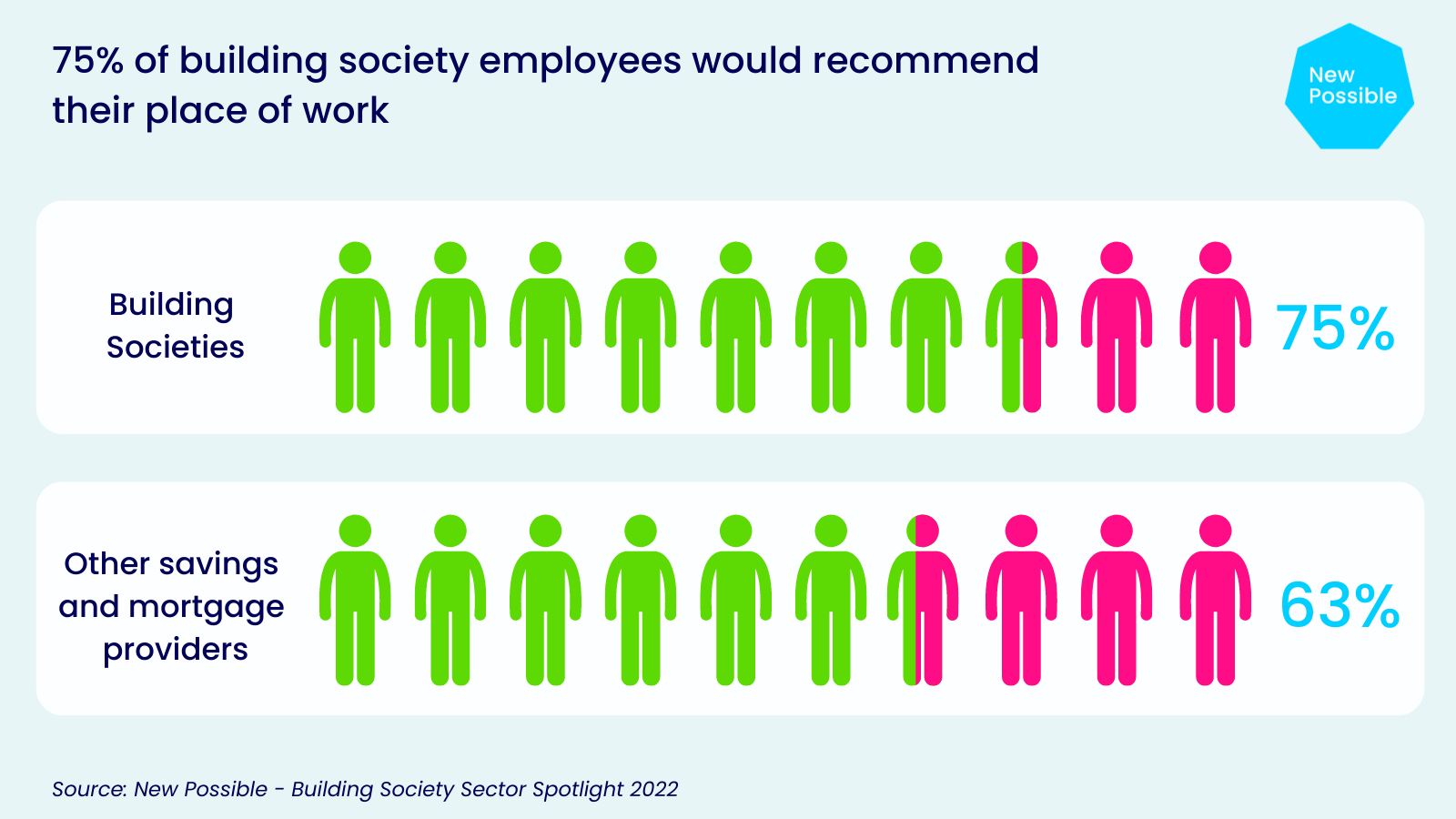
In 2022 so far, 75% of building society employees would recommend their place of work, compared to 63% across other savings and mortgage providers. The likelihood to recommend an employer is a useful proxy for job satisfaction and loyalty.
Building societies are therefore ahead of other savings and mortgage providers, which should help them to attract and retain talent.
In this sector spotlight, we also look at how the likelihood to recommend has changed since 2019, along with the key drivers of loyalty in the current environment. We also identify opportunities for the sector and where useful, include segmentation by seniority and asset size.
Building societies have bounced back stronger from a pandemic low
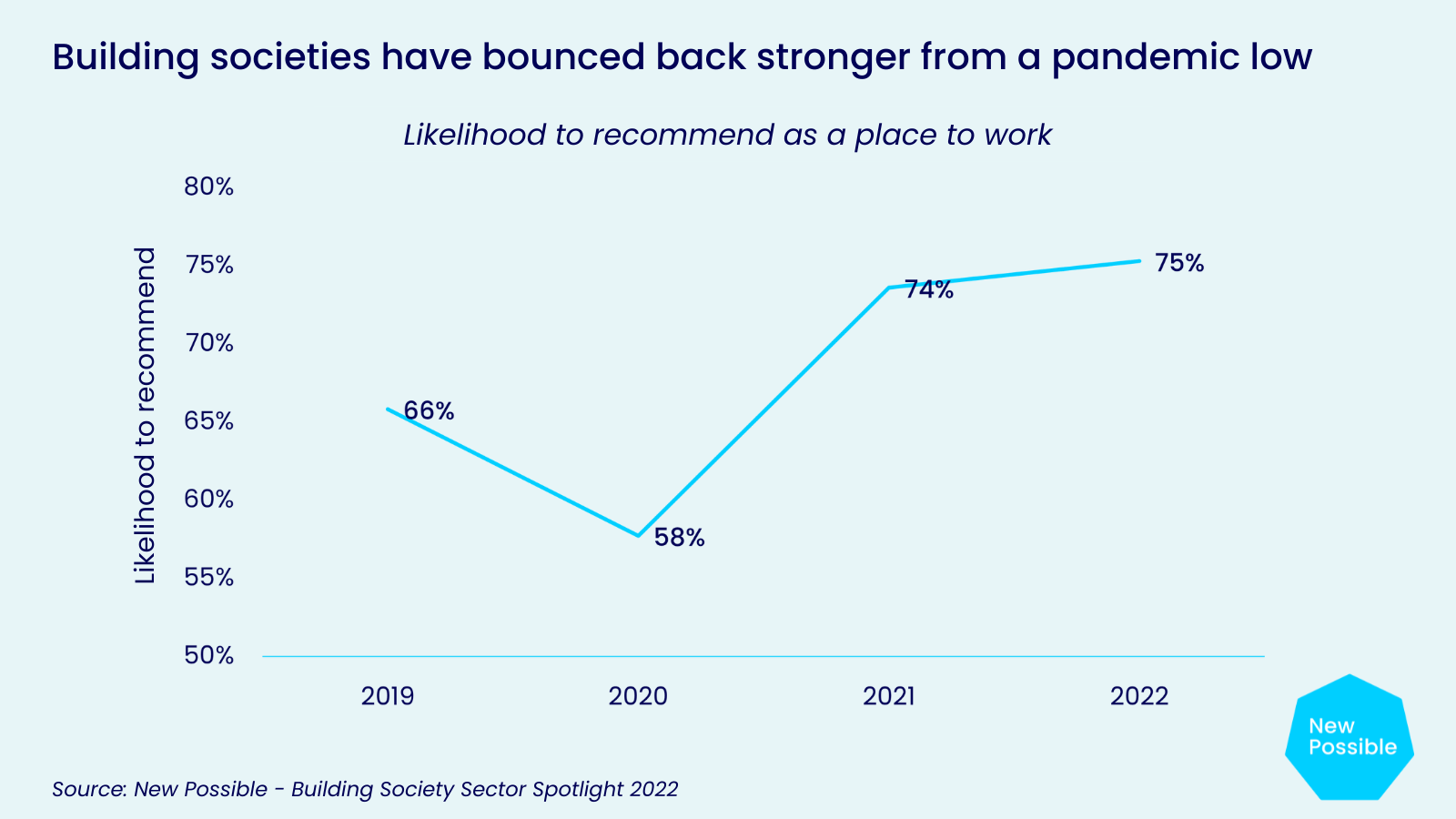
Although most employees were satisfied with how building societies responded to the pandemic, the likelihood to recommend building societies as an employer fell by 8% in 2020. Employees reported that some building societies struggled to adapt to the pace of change demanded by the crisis, with some describing a ‘risk averse’ culture and others talking about a ‘lack of urgency’. The sudden transition to remote working along with record high mortgage demand amplified gaps in technology and process. Communication was also an issue for some, occasionally resulting in employees feeling uncared for and ‘underappreciated’.
However, this dissatisfaction was short-lived. New tools and processes were introduced that better supported remote working and communication, which reversed some of the pain points that had been pulling down satisfaction.
What’s more, a renewed focus on wellbeing, flexibility, and work-life balance is often praised by employees across the sector. Greater flexibility has empowered people to shape where, when, and how they work, with leaders more often described as supportive, caring, and inclusive as a result. By being empathetic, listening to employees and adapting a flexible approach, many leaders across the sector are reaping the rewards of notably happier employees. And rather than a one-off bounce, this score has remained strong in 2022 so far.
Nate Harwood, Founder of New Possible, said “Employee expectations are growing, and it’s clear that many building societies are rising to the challenge and working hard to remain attractive places of work. But to keep on top of this change, it's now more important than ever for leaders to actively listen to their people and respond to what employee feedback is telling them. The organisations that get this right, will gain a powerful competitive advantage.”
New Possible helps leaders cut through the noise by capturing honest employee feedback and turning this into clear, actionable and benchmarkable insight. Book a demo to learn more.
Meaning and purpose through mutuality
Nearly two-thirds of employees surveyed by the management consultancy McKinsey & Company, said that COVID-19 had caused them to reflect on their purpose in life. A sense of purpose is now a much bigger driver of loyalty than ever before and building societies are in a good place to capitalise on this change. The values-based foundations of mutuality are something that employees are continuing to connect with and should be a boon for the sector when it comes to retaining and attracting new talent in the years ahead.
Healthy cultures are a key reason why employees stay
In this section, we’ve identified what matters most to employees. We’ve mapped the themes employees are talking about with how often they are mentioned and the average likelihood to recommend, allowing us to clearly see which themes are having the greatest impact on satisfaction and loyalty.
In the charts below, you can see the key drivers behind employee satisfaction at building societies vs. other mortgage and savings providers. For simplicity, we’ve only included the 9 most talked about themes (our AI identified 16 themes):
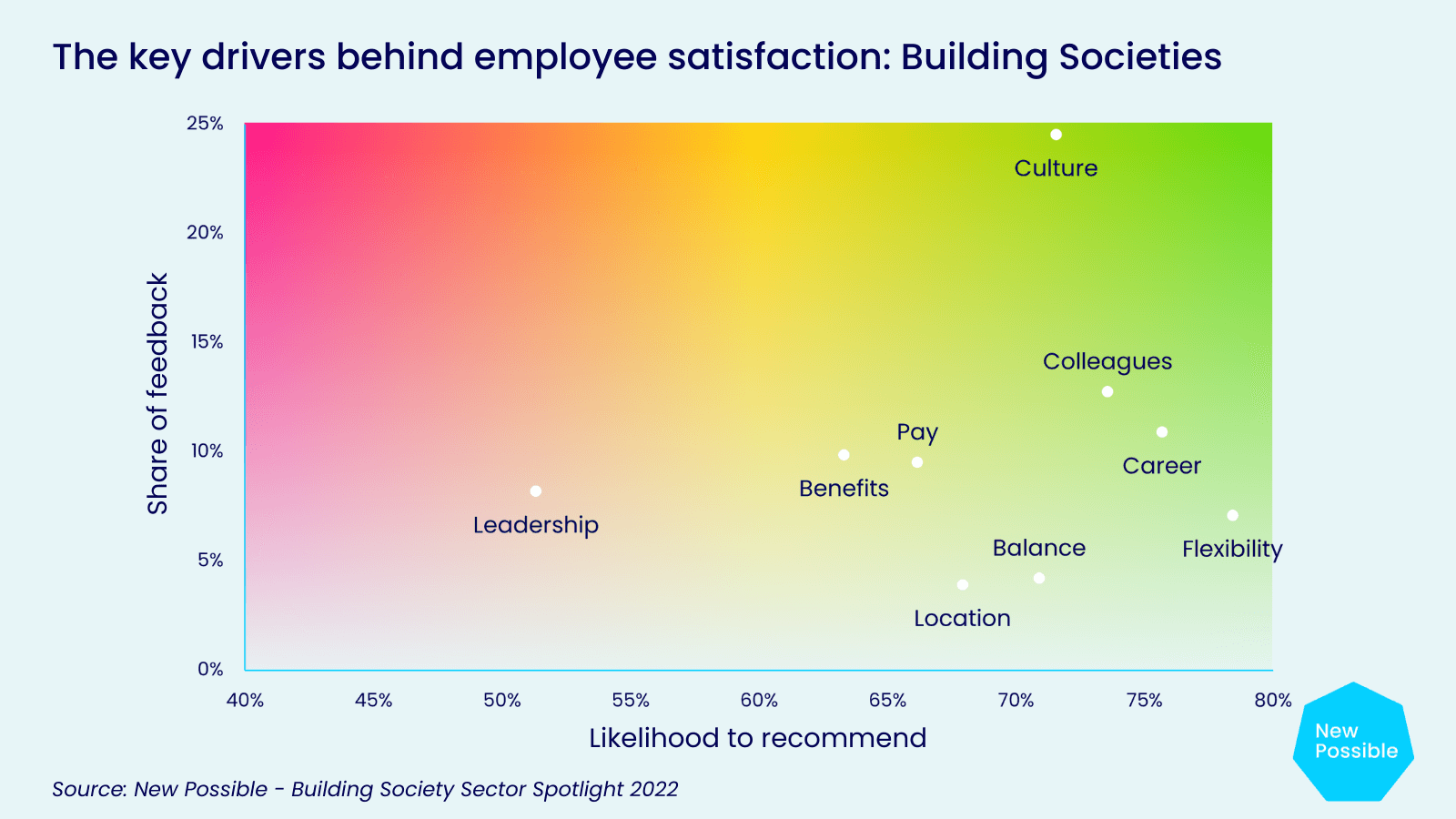
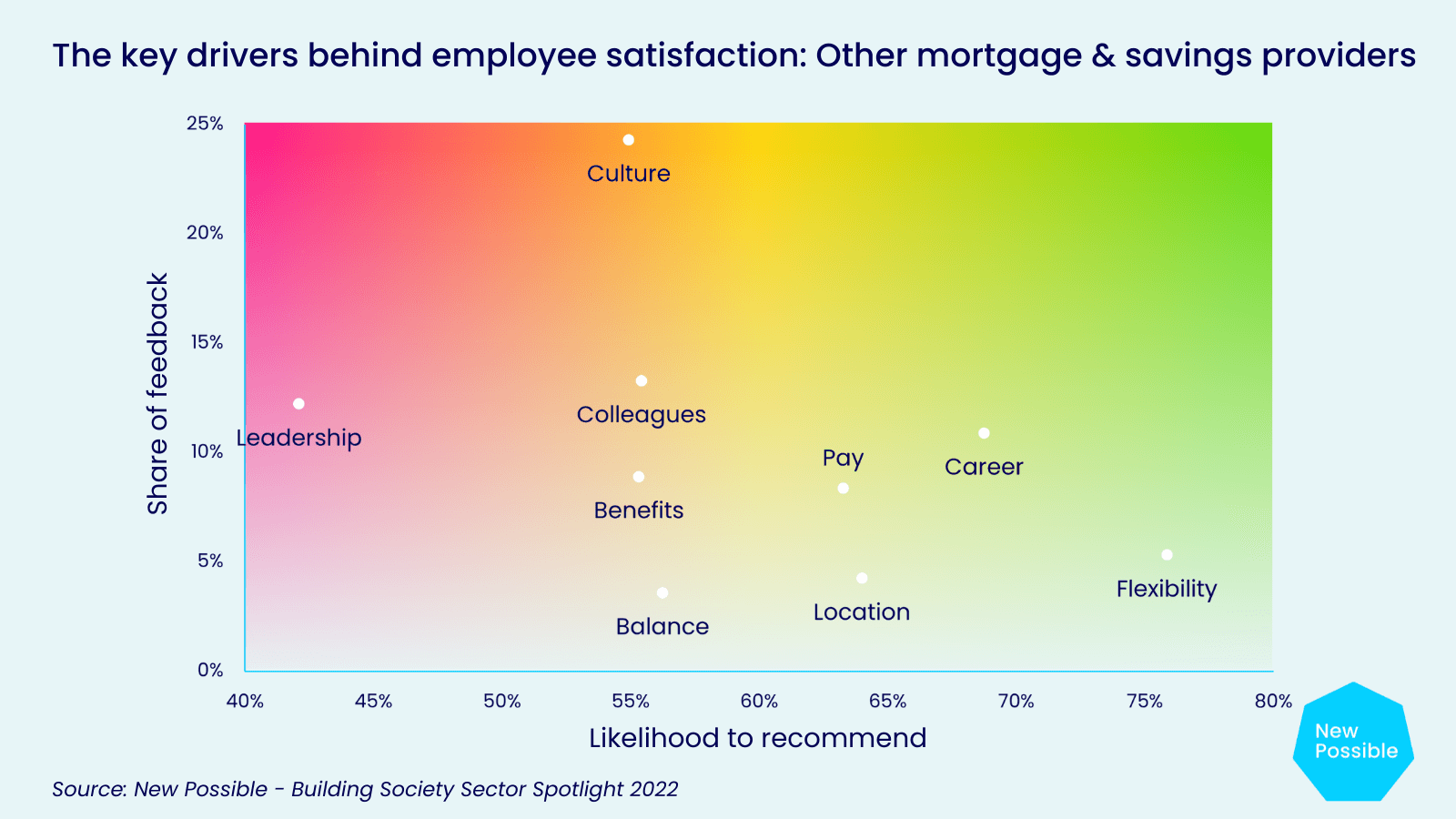
It’s clear that healthy cultures are having a very strong upwards pull on the likelihood that a building society employee recommends their place of work – much more than the comparison group.
But what do we mean by culture? We’ve shaped our definition around the FCA’s 4 drivers of culture – people, purpose, governance, and leadership. The below word cloud helps illustrate what building society employees are talking about most when it comes to this theme:
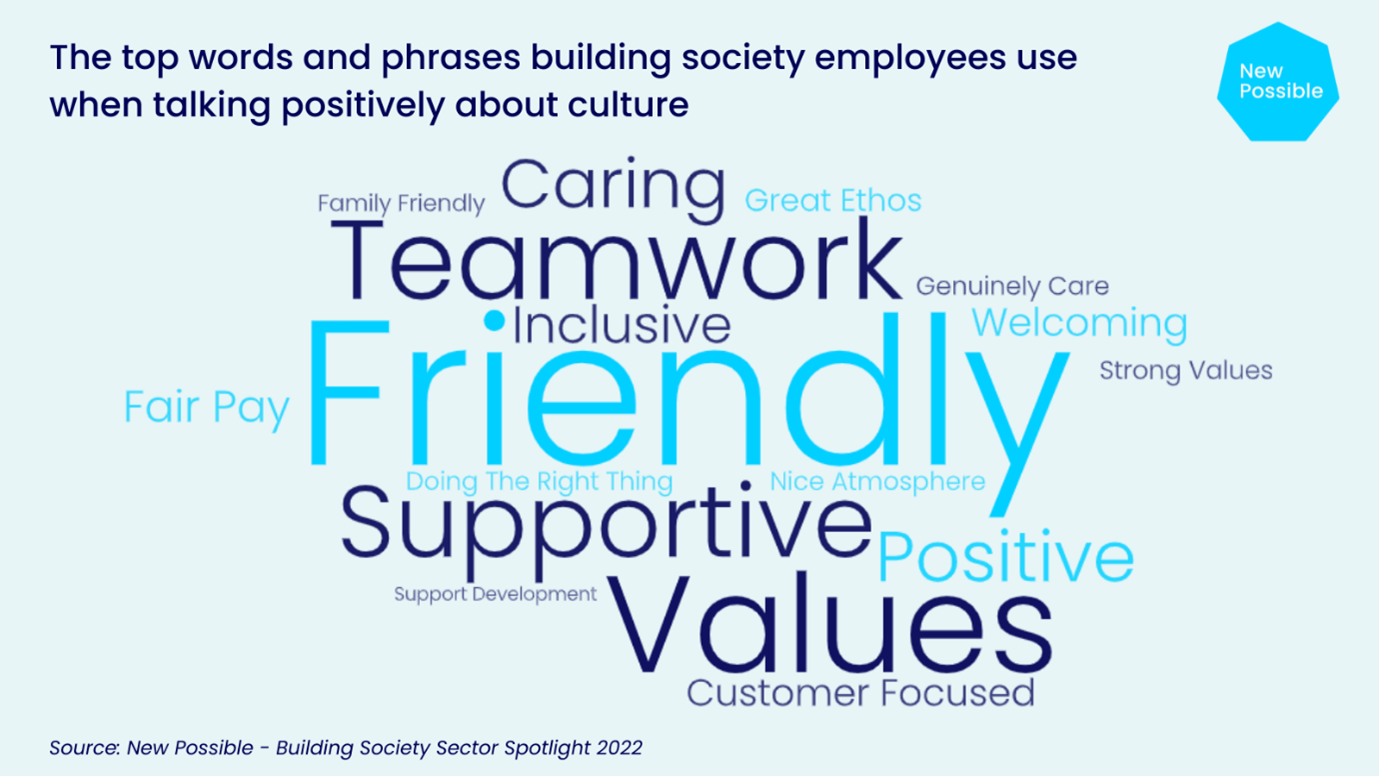
Building Societies are frequently described as friendly and supportive, offering good colleague relationships and teamwork. They are also generally perceived as values driven, welcoming and inclusive.
However, not everything is glowing when it comes to culture. For example, employees occasionally talk about a need to improve communication between departments and from leadership. Some employees also expressed concern about a lack of diversity across senior management, along with ‘cronyism’ and an ‘if your face fits’ approach to progression. Others suggested that managers and leaders need to become better at listening to feedback and understanding what’s really happening on the frontline. Larger societies (those with over £2bn in assets) are more likely to attract negative feedback around culture and leadership.
Despite there being some opportunities to improve, building societies are generally regarded by employees as having healthy cultures. The sector also compares very favourably vs. other savings and mortgage providers, who are more likely to see complaints of bullying and other behaviours considered toxic.
New Possible’s CultureCheck offers a benchmarkable survey and real-time dashboard that's structured around the FCA's 4 drivers of culture, with meaningful insights that help leaders identify opportunities to build healthier organisations. Used by a range of organisations, including financial services firms, we help leaders gain a 360-degree view of their people experience, by measuring 7 themes, including satisfaction and wellbeing. Read about our mission, or book a demo to learn more.

Building societies are rated high for career development
Building societies are seen as a good place for career development at both the junior and management level, with this theme being a key driver behind the likelihood to recommend.
Employees often talk about good training, along with plenty of opportunities to learn and progress within the building societies they work.
Flexibility is increasingly expected and helping to make the sector more inclusive
More employees talked about flexibility than at any other time since 2019 and when flexibility was mentioned, it had the strongest upward pull on the likelihood to recommend. We define flexibility as a way of working that suits an employee’s needs, for example having flexible start and finish times, or working from home. In short, flexibility really does matter.
Flexibility can also be a positive sign of a firm’s culture. To be successful in practice, it requires leaders to listen and trust their people and it can also help make workplaces more inclusive, as illustrated by comments such as ‘good if you're a working mum’ and ‘suitable for people with family and kids’. Building societies are also highly rated for work-life balance vs. other savings and mortgage providers.
Expectations around flexibility are growing and building societies that fall short are seeing employees increasingly vote with their feet, while those that get it right are benefiting from higher satisfaction, loyalty, and access to a broader talent pool.
Pay is a growing reason why junior employees leave
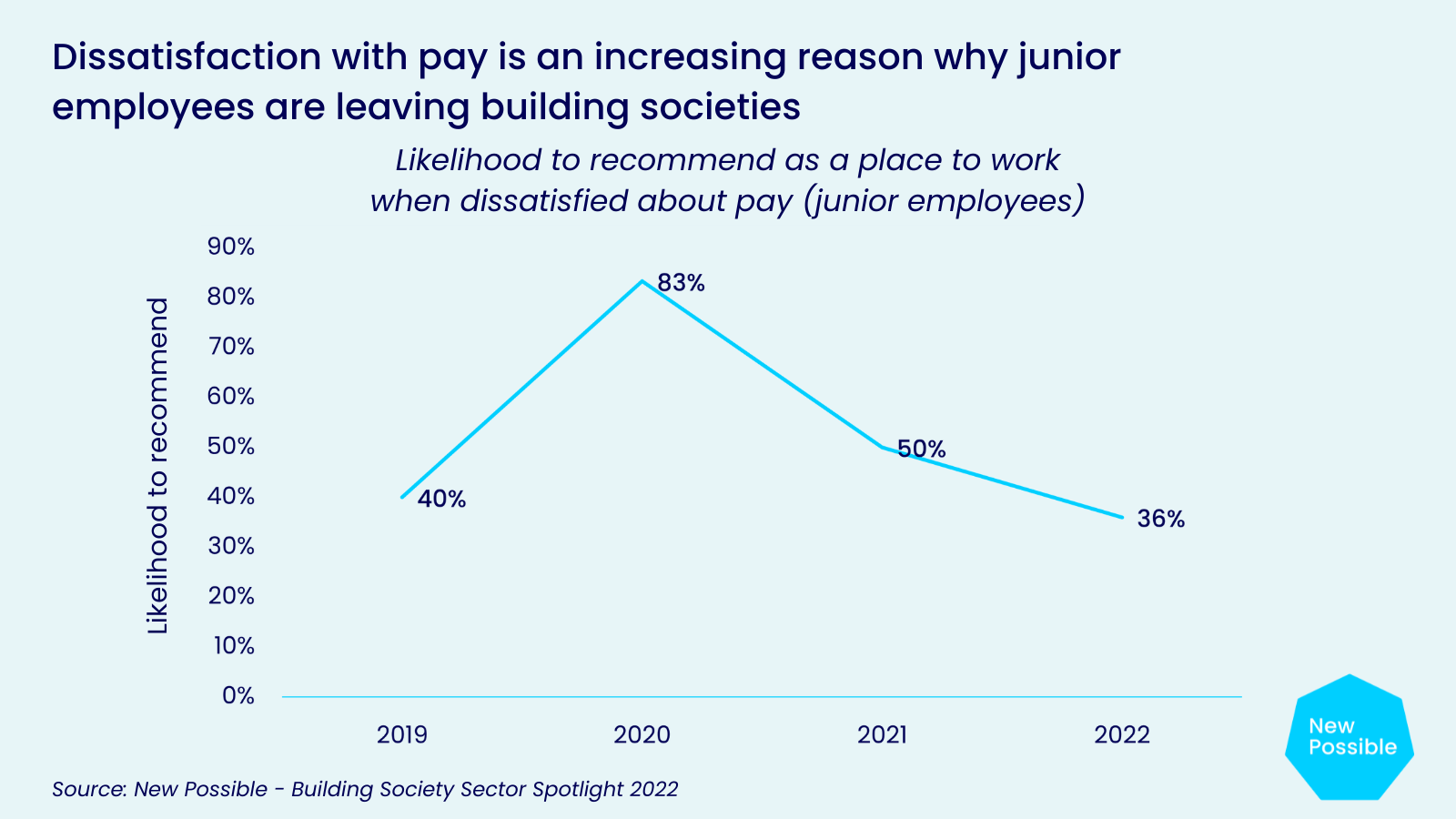
Employees in junior (non-managerial) roles are particularly sensitive to changes in their spending power. After all, a segment of this population is often younger, earlier on in their careers and naturally ambitious in seeking higher pay. It’s perhaps unsurprising therefore, that our data suggests that pay is a much bigger driver of employee loyalty for junior employees.
During 2020, at ground zero of the pandemic, we saw dissatisfaction with pay become a less common reason why junior employees leave. Most were just happy to have a secure job, while reduced household spending during lockdowns eased pressure on pay packets.
However, pay quickly jumped up the agenda again. The latest data suggests that dissatisfaction with pay is becoming even more of a consideration in deciding whether junior employees stay – no doubt accelerated by the cost-of-living crisis.
Recent data from the economic consultancy Cebr indicates that March 2022 saw disposable income experience its largest percentage drop since 2011. In general, this hurts those on lowest incomes hardest. And with that pressure, junior employees are more likely to look elsewhere, particularly when a labour shortage is pushing up advertised salaries.
Across junior staff, 39% talked negatively about pay in 2022 so far and it’s clearly an issue that’s unlikely to go away anytime soon. Employers can respond by ensuring that those on the lowest pay receive a fair ‘living’ wage, as well as communicating clearly about opportunities to progress and increase pay. Building societies can also bring down the cost of commuting by offering flexibility around remote working.
The more senior you are, the happier you’re likely to be
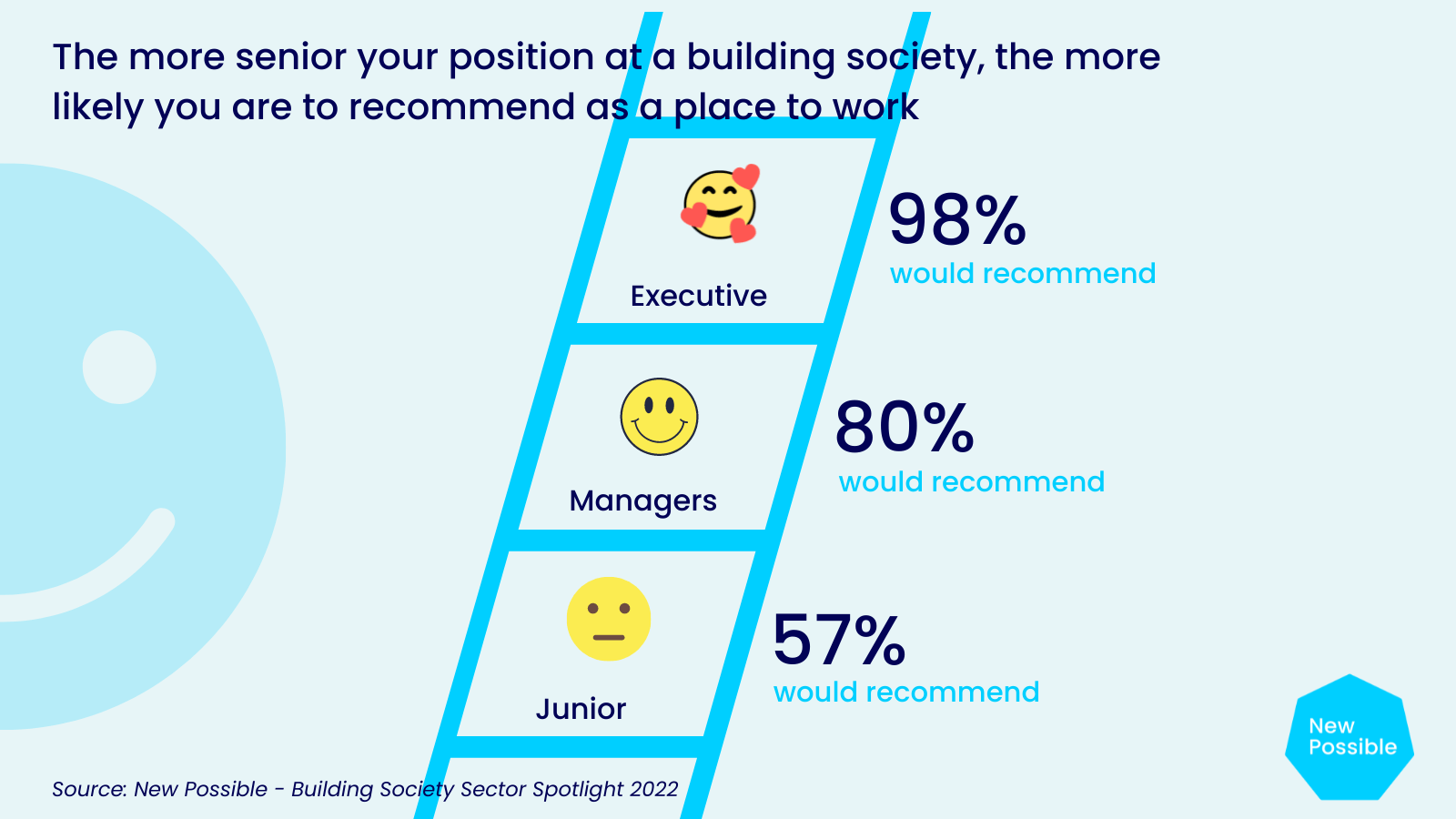
Employees in executive and management positions are more likely to recommend the building societies they work for than those in junior roles.
Perceptions of a healthy culture and a belief in the vision were key drivers behind higher levels of satisfaction felt by those in leadership positions. Vision was talked about 14% of the time by leadership, compared to 3% for managers and 1% across junior employees.
This suggests that the enthusiasm that leaders have about the direction of their organisation isn’t always shared by those lower down in the hierarchy. By increasing vision buy-in from managers and junior employees, building society’ leaders will foster a greater sense of purpose, which is increasingly a powerful driver of satisfaction and loyalty.
The data also highlights that a leader’s experience of culture can be very different to those on the frontline. And without honest and regular feedback from employees across all levels of the organisation, even the most seasoned leaders can be unaware of what’s really happening in the engine room.
Key takeaways
- 75% of building society employees would recommend their place of work, vs. 63% at other savings and mortgage providers.
- Although the likelihood to recommend an employer fell during the pandemic, the sector has bounced back strongly. New technology and processes that support home working were introduced whilst a renewed focus on wellbeing, flexibility, and work-life balance improved the working lives of many.
- Expectations around flexibility are growing, with more employees talking about it than at any other time since 2019. Building societies that fall short are seeing employees increasingly vote with their feet, while those that get it right are benefiting from higher satisfaction, loyalty, and access to a wider talent pool.
- Healthy cultures are a key strength for building societies vs. our comparison group. They are frequently described as friendly and supportive, offering good colleague relationships and teamwork. They are also generally perceived as values driven, welcoming and inclusive.
- However, there are opportunities to improve cultures. For example, employees occasionally talk about a need for better communication between departments and from leadership. Some employees also expressed concern about a lack of diversity across senior management, along with ‘cronyism’ and an ‘if your face fits’ approach to progression. Others suggested that managers and leaders need to become better at listening to feedback and understanding what’s really happening on the frontline.
- A sense of purpose is now a much bigger driver of loyalty than ever before - building societies are well placed to benefit from this change if they clearly articulate their values of mutuality to current and potential employees.
- Despite perceptions around pay generally improving since 2019, it’s a growing reason why junior employees are leaving the sector – a trend that could be accelerated by the cost-of-living crisis. Employers can respond by ensuring that those on the lowest pay receive a fair ‘living’ wage, as well as communicating clearly about opportunities to progress and increase pay. Flexibility around remote working can also bring down the cost of commute.
- The more senior your position at a building society, the more likely you are to recommend it as a place to work. A belief in the vision was a key driver behind this, with those in leadership positions talking about vision 14% of the time, compared to 3% for managers and 1% across junior employees. By increasing buy-in from managers and junior employees around vision, building society’ leaders will foster a greater sense of purpose.
- We recommend having an employee insight strategy in place that promotes honest and regular feedback, so that leaders can quickly understand what’s working and what’s not at all levels of their organisation.
About New Possible
New Possible is on a mission to help every leader unlock the competitive advantage of their people. We work with a range of firms (inc. building societies) to provide clear, actionable and benchmarkable insights. Our CultureCheck survey is structured around the FCA’s 4 drivers of culture, and we also help leaders gain meaningful insight into the broader people experience, measuring 7 themes, including satisfaction and wellbeing. Read about our mission, or book a demo to learn more.
If you’d like to discuss this report further, please email hello@newpossible.io or call 0161 706 0618.

